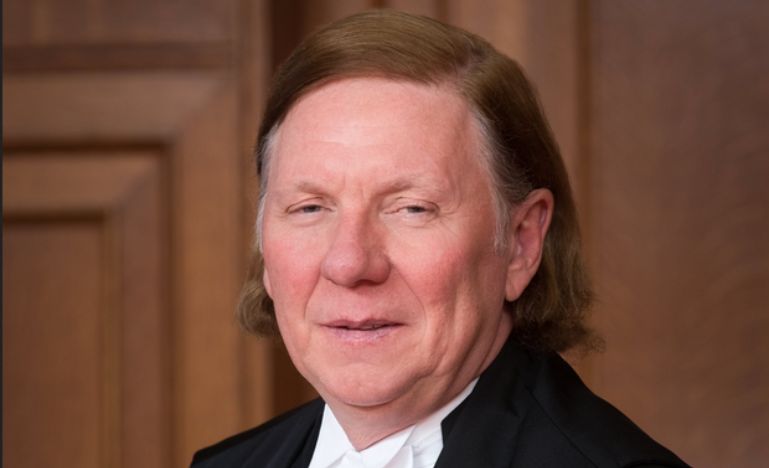Broad perspectives and strong foundations
Justice Malcolm Rowe tells students, new lawyers to be open to opportunities beyond the conventional practice of law

Long before he ever wore one of the Supreme Court of Canada's fur-trimmed red robes, Justice Malcolm Rowe sported a black and white ensemble more befitting a flightless seabird.
“We were the penguins in the middle,” he says of his attire as clerk assistant in the House of Assembly of Newfoundland and Labrador, where he served as procedural advisor to the Speaker and had a desk in the centre of the floor.
“But we had the best seat in the legislature.”
It was Rowe’s first job out of law school, and as someone who always found the operation of government interesting, he gained first-hand insight into its workings.
From there, he joined the foreign service where he spent most of his time in New York and Havana in non-legal roles.
It was only after five years of doing other things after law school did he decide he wanted to practice and joined what is now Gowling WLG. But within a year, he branched back into international matters, advising on maritime boundaries and taking part in negotiations on high seas overfishing on the Grand Banks.
For a few years, his work was a mix of conventional legal practice and government advisory work. Along the way, he became the clerk of the executive council and secretary to cabinet in the Newfoundland and Labrador government.
He made partner at Gowlings, but was then offered the chance to become the head of the public service back home. It wasn’t a legal position and came with a pay cut.
“I left with no real plan,” Rowe says. “But I knew it was an offer that wouldn’t come around again.”
By the time he was appointed to the Newfoundland and Labrador Supreme Court, Trial Division in 1999, Rowe estimates he’d spent about 40 per cent of his career in non-legal roles.
“Being qualified as a lawyer can open up other opportunities,” he says.
“I think I’ve done some interesting things along the way. I was willing to take the chance.”
While meeting with law students during a visit to the Canadian Bar Association’s office this spring, Rowe tried to drive home the value of this approach.
While you should have a plan, work hard in law school and take advantage of what’s available to prepare for the profession, always be open to what may come your way.
“On occasion, circumstances will present an opportunity to move beyond the conventional practice of law. I would be open to those possibilities,” he says.
Rowe moved to the Court of Appeal in 2001 and the Supreme Court of Canada in 2016. He brought executive, legislative, and judicial experience, coupled with an international perspective, with him. While his non-legal work doesn’t necessarily help when hearing a criminal case, he told the students that issues arise in some big public law cases and that past experience aids in them.
Asked if there’s an experience he had in school or the working world that benefited him once he decided to practice law, Rowe says there isn’t one specific thing. Instead, key for him was to gain a broad knowledge base and build himself a solid foundation.
“It’s the general idea that you prepare yourself in a wide range of areas and have a background in contracts, criminal, constitutional, administrative,” he says.
“Then you have a base from which to build. If you specialize too early, too deeply, you may disadvantage yourself in terms of being able to adapt to new situations or being able to take on new opportunities.”
At a time when the legal profession, the economy, and society in general are changing rapidly, Rowe says a solid foundation and adaptability are key.
That said, amid the change, some things remain the same. Among them? Imposter syndrome.
Rowe recalls it took him nearly two years to start feeling comfortable in a legal role and get past his concerns about presenting himself as a lawyer and not harming clients’ interests. Overcoming it meant working hard and being diligent, but also seeking out the advice of more experienced counsel.
“One of the things that I think is most difficult for a lot of young lawyers now is that we don't have the mentorship which was traditionally how young lawyers were brought into the profession,” he says.
“We were taken under the wings, so to speak, by a more experienced lawyer, and you learned from watching them and from the more experienced lawyer explaining how something was done and why.”
Rowe says even if you don’t have a mentor or a principal to work with directly, it’s still good to have someone you can go to when faced with a dilemma to seek their advice.
However, even with a mentor to draw on, he admits every time he changed his roles and responsibilities, the imposter syndrome “kind of popped up again.”
“But the older you get and the more times you change responsibilities, you kind of get to feel that, ‘I've made big changes before I can do it again. I just have to concentrate and look for people who are more experienced to advise me in this area.’”
Like any career path, Rowe’s has had curveballs and times when things just didn’t work out. His approach has been to recognize it and do a course correction.
“You can never count on everything working out, and so it isn't so much that you're going to hit adversity, it's how you handle it. The answer is to assess as objectively as you can,” he says.
“It may mean walking away from money, from a well-paid position. It may mean putting yourself at a disadvantage for a while because you want to do a reset because a reset is what’s needed.”
Making more money has never been Rowe’s principal motivation. Rather, he’s driven by interesting and meaningful work alongside good, engaged and ethical people from whom he’s been able to learn.
“If you see an opportunity of that nature, where you can develop in a different direction, and you're engaged in something worthwhile with people you respect, that sounds like a good opportunity to me,” he says.
In that regard, for him, working alongside former Supreme Court chief justice Beverley McLachlin was a highlight of his career.
“She was just in a category of her own,” Rowe says.
“She was a tremendous jurist. She was a very wise woman. She was a person of great integrity. She was in that special category of people who you're lucky if you meet them at any point in your life, and if you get to work with them, you’re doubly lucky.”


